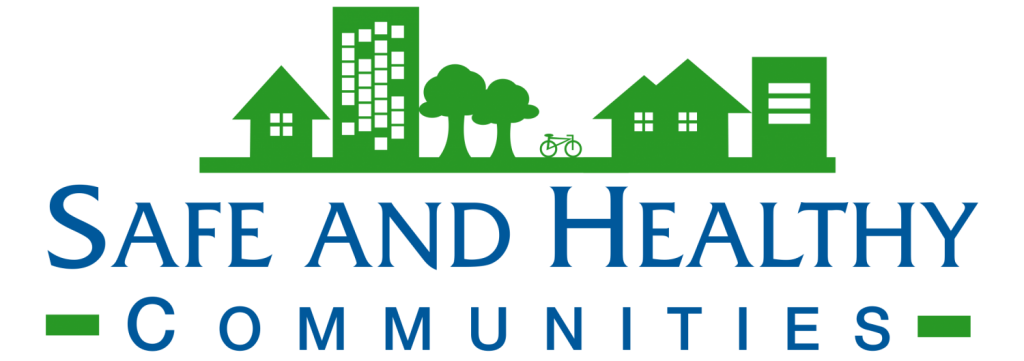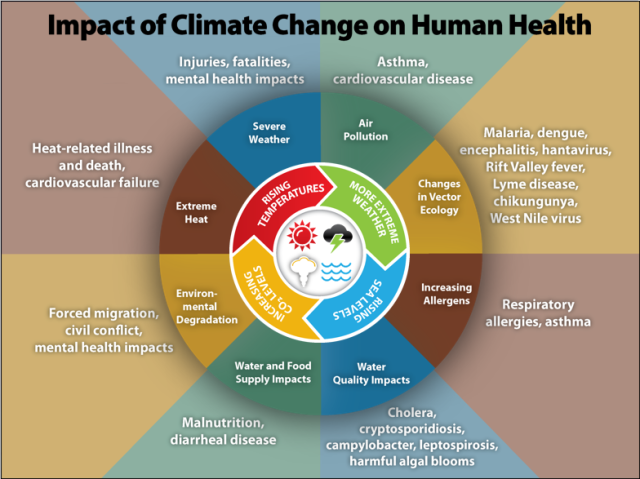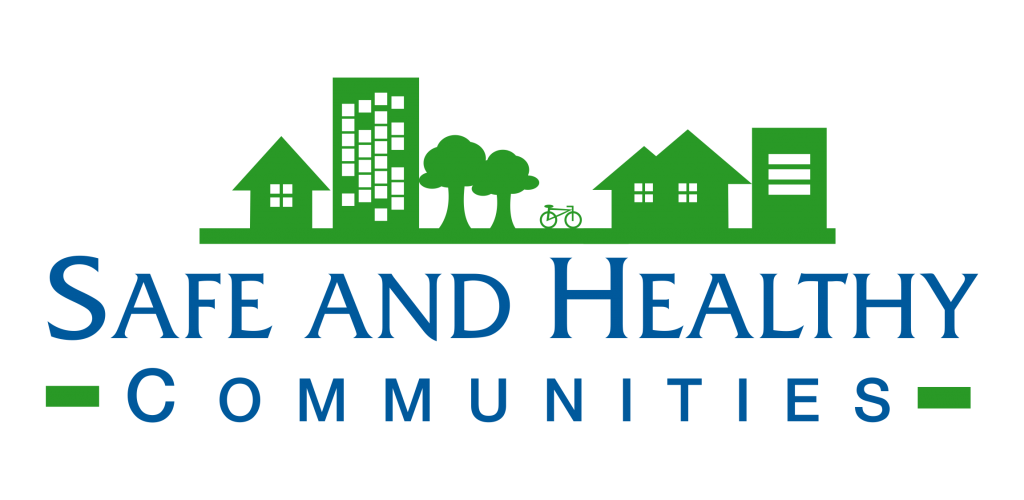How can climate affect health?
- Power outages that affect hospitals, homes, and transportations services
- Occupational hazards such as heatstroke
- Increasingly intense and deadly storms and flooding
- More infectious diseases from hotter days and more rain
- Mental health issues due to more floods, droughts, and heat waves
- Reduction of crop production that can lead to a lack of access to food
- Increased respiratory diseases from mold, fungi, and indoor pollutions from higher heat temperatures
 An increase in temperature leads to different health-related disruptions all over the world. The effects of these disruptions can lead to increased respiratory and cardiovascular disease, injuries and premature deaths, changes in prevalence and geographical distribution of food and water borne illnesses and other infectious diseases and threats to mental health. Climate change has and will continue to have detrimental effects on air pollution, allergens, pollen, food security, wildfires, floods, and stress related disorders. Extreme temperatures are the deadliest weather-related event, with an estimated 12,000 Americans dying every year due to heat waves. Adults over age 60 are estimated to account for 80% of these heat-related deaths. Some existing health threats will intensify, and new health threats will emerge over time. Climate change disproportionately affects people of color and low-income Americans and others who are more likely to suffer from the consequences of storms due to inadequate infrastructure, less ability to get out of harm’s way, and less access to quality healthcare, to list a few.
An increase in temperature leads to different health-related disruptions all over the world. The effects of these disruptions can lead to increased respiratory and cardiovascular disease, injuries and premature deaths, changes in prevalence and geographical distribution of food and water borne illnesses and other infectious diseases and threats to mental health. Climate change has and will continue to have detrimental effects on air pollution, allergens, pollen, food security, wildfires, floods, and stress related disorders. Extreme temperatures are the deadliest weather-related event, with an estimated 12,000 Americans dying every year due to heat waves. Adults over age 60 are estimated to account for 80% of these heat-related deaths. Some existing health threats will intensify, and new health threats will emerge over time. Climate change disproportionately affects people of color and low-income Americans and others who are more likely to suffer from the consequences of storms due to inadequate infrastructure, less ability to get out of harm’s way, and less access to quality healthcare, to list a few.
Health Outcomes and Access
Social factors such as financial resources, education status, age, and race and ethnicity play a role in climate risk. Language barriers also play a key role and can influence access to health care needs and services.
Social Factors
Substandard housing conditions are disproportionately more common among historically marginalized and underserved communities and people with lower incomes. Families with low financial security are most likely to live in unhealthy housing conditions and are also less able to remedy them, further contributing to disparities. To address the complex interactions between housing, neighborhoods, equity, and health, strategies that include policies, design, and programs must be interdisciplinary ─ focusing on the quality, safety, accessibility of housing, health-promoting conditions and amenities in neighborhoods, and access to affordable housing.
Adaptation and Mitigation Plans that Reduce Effects of Climate and Health Impacts
 Climate change can be hard to predict but good planning plays an important role in ensuring the health and well-being of residents. Climate action plans generally include greenhouse gas (GHG) emissions reduction targets and detail actions the federal, tribal lands, state, or city government and organizations can take to help meet those goals. Focus areas to reduce the effects of climate change and reducing GHG emissions are, boosting energy efficiency in buildings, investing in electric vehicle infrastructure, improving access to public transportation, and investing in renewable energy.
Climate change can be hard to predict but good planning plays an important role in ensuring the health and well-being of residents. Climate action plans generally include greenhouse gas (GHG) emissions reduction targets and detail actions the federal, tribal lands, state, or city government and organizations can take to help meet those goals. Focus areas to reduce the effects of climate change and reducing GHG emissions are, boosting energy efficiency in buildings, investing in electric vehicle infrastructure, improving access to public transportation, and investing in renewable energy.
Climate change has affected every state’s ecological system in some way. For example, according to the 2022 Health and Climate Index, counties in western Colorado had higher risk scores due to climate-influenced exposures such as wildfires, flooding, drought, and extreme heat. The eastern portion of Colorado showed low overall risk, but still experience days of extreme heat and drought.
How SHC can help:
- Research and work collaboratively with stakeholders on the development of community resilience plans that seamlessly incorporate steps for disaster preparedness and recovery actions with other community plans
- Integrate health, equity, and climate change related issues into planning documents i.e., transportation, neighborhood, and housing
- Conduct health impact assessments of redevelopment, transportation and climate action plans or related policies or plans to understand the positive or negative impacts to health and equity.
- Research best practices that engage the community with a public health and equity focus of mitigation and adaptation plans.
- Engage populations, especially people with disabilities, and older adults and historically underserved and marginalized groups, in every stage of the development of climate related planning and development process by conducting focus groups, surveys, charrettes, and interviews
- Collect qualitative and quantitative data and analyze data to evaluate how climate policies and other decision-making affect public health and equity
- Support effective coalitions, advisory groups, partnerships, and collaboration by facilitating stakeholder discussions, training, and organizational capacity building for effective planning and decision-making related to climate and resilience


